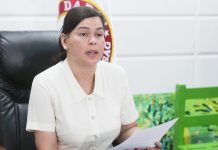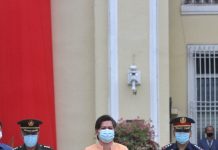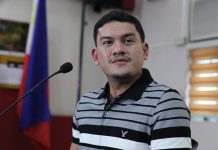Peace and order.
That was one of the major issues faced by Mayor Sara Duterte-Carpio when she accepted the challenge to run for mayor of Davao City. Her father, Rodrigo Duterte, the outgoing mayor, was leaving a landmark legacy in the area of peace and order which was deemed by many as a hard act to follow, and the main reason behind his durable leadership which political rivals discovered to their dismay each time they dared run against him.
That was also Inday Sara’s dilemma during the May 2010 election campaign when many Dabawenyos, including the opposition, questioned her capacity to continue the relative security enjoyed by the city under her father’s administration for the past almost 20 years anchored on his hard-line policy against all types of criminality which earned for him the moniker “The Punisher” from the prestigious Time magazine.
While the younger Duterte did not always see eye to eye with her father on certain issues affecting the city when she was still vice mayor and as mayor, her first 100 days as chief executive have shown Dabawenyos that she is indeed made of the same stuff as the elder Duterte when it comes to making tough decisions—minus the elder Duterte’s “colourful” language when aroused.
In her recent state of the city address, Mayor Sara reiterated her administration’s commitment to maintain peace and order in the city considering that such an environment is “the backbone of all economies.”
This she aims to maintain despite slashing the P53 million peace and order fund from next year’s proposed P4.11 billion budget. While the budget has increased by P78,032,357.83 from the current year’s P4.03 billion, the lady mayor’s priority is in the area of social development.
“We have allotted 46% of the fund for Social Development because the first duty of government is individual security and family enhancement,” Duterte-Carpio said.
The city’s economic development was allotted 16 percent of the pie, specifically for funding the city’s tourism, cooperative services, agriculture and fisheries development and investment generation.
Despite the city’s still unimplemented projects, infrastructure got only 13 percent of the budget.
Law Enforcement
Just last month, the mayor lamented the rising incidence of armed robberies as well as petty crimes in the city. She also expressed her desperation over the need to constantly defend the police when in fact it is their job to go after robbers and other criminals.
Deputy director for operations of the Davao region police office, Senior Superintendent Jose Jorge Corpuz, confirmed the mayor’s pronouncement on the increasing crime incidence.
“There was an increase in Region 11’s crime volume from 6,733 in January to August 2009 to 6,834 during the same period this year,” he said, but emphasized that the crime solution efficiency rate has also increased from 11.94 percent in 2009 to 12.56 percent in 2010.
Davao City police office PSSUPT Rene Aspera said the traditional “ronda” being done in various city barangays should be encouraged as it remains a deterrent against akyat-bahay gangs, especially in non-gated subdivisions. “But we urge homeowners not to engage the criminals—it is best to just call the police,” he said.
As reported by Duterte-Carpio in her SOCA, the DCPO had a higher crime solution efficiency rate of 24.26, although this was only for the third quarter. The police reported 308 cases of crimes committed against persons with 80 cases filed and a total of 1,131 cases of crimes against property, with 179 cases filed.
The Mayor is bent on increasing the crime solution efficiency rate of the police through an incentive system which will take effect during the last quarter of this year. The incentive system provides that P15,000 in cash incentives to the police for every five cases of murder or homicide that have been solved and taken to court.
A P5,000 cash incentive will be given to the police for every five rape cases, P5,000 for drug cases, P1,000 for every five physical injury cases, P3,000 for every five carnapping, theft, cattle rustling or robbery case, and P3,000 for every five cases of drug possession—all solved and cleared.
But more than the cash incentives for crime solution, the City has also started providing rice subsidies to police units with computed monthly allotments. Police visibility and vigilance is also expected to be enhanced now that the mayor has committed to provide them with meals and gasoline rations.
Barangay empowerment
Duterte-Carpio is also determined to empower the barangay, especially when it comes to maintaining peace and order in the city, by allotting “25% of the budget to development administration with emphasis on addressing barangay development.”
“We have budgeted for the PhilHealth contributions and honoraria of approximately 3,100 barangay tanods,” she said. The tanods attended lectures last week on strengthening barangay operations for security.
She said she had directed the DCPO and Task Force Davao to ensure a decrease in crime incidence and an increase in crime resolution as well as zero terrorism incident and that there is a plan to tap volunteers to assist the police in crime prevention.
On top of Duterte-Carpio’s anti-crime campaign is the war against drugs which she aims to win through active and knowledgeable PDEA informants in the person of the city’s security personnel who will be made to undergo seminars conducted by the Philippine Drug Enforcement Agency.
“We have started the advocacy of a drug free workplace and conducted a drug testing project with 319 Task Force Davao personnel and 1,162 Davao City Police Office personnel or 97% of our total law enforcement population,” she said.
Duterte-Carpio added that of the 1,481 that were initially tested, only three were submitted for confirmatory test and none of these tested positive. The city hall plantilla employees are due for random testing and this shall be done before November 15 by the HRMO.
Economic front
The city continues to perform well in the economic front, Duterte-Carpio said, mainly because the past administration had laid down a sturdy foundation for peace and security. “It paved the way for Davao to rebuild a favorable environment for business and commerce to prosper. It even brought Davao many accolades from national and international bodies. We are now reaping the fruits of that legacy. And we shall continue to move forward and upward in unity.”
Duterte-Carpio intends to push the city’s economy forward by focusing on eco-tourism that centers on the tri-peoples of Mindanao.
“It is time to embark on a tourism campaign that captures our great city’s Muslim-Christian-Lumad peaceful coexistence and the wealth of our natural resources,” she said.
After identifying eco-tourism as the city’s greatest asset, she added that the city is on its way to bolstering its rank as among the top six travel destinations in the country despite Mindanao image problem. “The Mindanao situation will no longer be my excuse,” she said.
Duterte-Carpio has ordered the preparation of the city’s tourism industry to include “our grassroots based souvenir production centers, our pasalubong centers, our visitor centers, and our volun-tourguides.
It has been more than a hundred days since the younger Duterte accepted the challenge to make life better for every Dabawenyo, and to make Davao City a better place to live in. And while she is off to a good start, no one will argue that there is still so much to be done, and so much to learn, when it comes to keeping the house, the City, in order.






